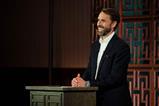Reflecting on his own father and being a dad himself Ed Mackenzie helps Christian dads consider what makes a good father

On June 15th this year, families across the nation will celebrate Father’s Day. Fatherhood is likely to bring up different emotions in families. For some – hopefully many – emotions will be positive, and the day will be a chance to give thanks for the dads within the home. For others, the day will bring up mixed emotions due to the absence of a father, or perhaps a dad’s death. Churches which engage with the Father’s Day celebration would be wise to remember these various experiences – while also encouraging dads (and male role models within the church) in their midst.
as dads we can echo the love of God by remaining engaged with our children throughout their lives
Father’s Day leads me to reflect on my own experience of having a dad. I remember his presence in the home throughout my childhood, his commitment to pursuing a vocation (as an artist) which he loved, and his modelling of faithful commitment as a husband to my mum. It’s not always the case that people share positive experiences of their fathers, so I’m grateful for all that my dad has given me!
As a father of two sons, I’m also led these days to reflect on my own being a dad. How do I want to be and act as a father to help my kids flourish, and especially to flourish as lovers of God? Three qualities come to mind: engaged presence, faithful modelling, and open communication.
One - Engaged Presence
Engaged presence is more than simply physical presence; it’s also about being present to the hopes, dreams and worries of our kids every stage of their life. This reflects the way God is present to his people within Scripture, and especially in the incarnation (John 1:14) and the giving of the Spirit (Rom 8:15). Since God engages with us as his children, as dads we can echo the love of God by remaining engaged with our children throughout their lives.
As a dad of two teenagers, the form of that presence looks different than when they were toddlers or tweenagers. There is a necessary form of individuation – or separation – that teenagers undergo as part of their adolescence. And yet, it’s vital that we remain present and engaged throughout these years too, as it is for those years when children ‘leave the nest’ and yet remain our kids. For me, this means taking an active interest in my children’s hobbies and interests, whether parkour, PlayStation or pull-ups! It also means finding time to talk, which these days I found often takes place in the midst of shared activities or late at night.
Two - Faithful modelling
The importance of modelling a way of life is found throughout the scriptures. In Proverbs, children are to take stock of the example of their elders (Prov 1:8-9); in the gospels, the disciples are to follow the way of Jesus (Mark 8:34); and in his letters, Paul calls believers to ‘imitate’ him as he imitates Christ (1 Cor 11:1). For followers of Jesus, we might say that our lives as a whole can witness to the love of God, modelling the way of life into which he invites us.
Within the home, kids will inevitably pick up some of our habits and values, as well as spotting whether there is a consistency between what we say and what we do. Dads have a real opportunity to show in their lives a pattern of life which reflects the love of God and neighbour. Rachel Turner of Parenting for Faith helpfully speaks of ‘creating windows’ for children, allowing them to see something of our relationship with God. Such windows are also forms of faithful modelling, and while we are all far from perfect, we can show our continued desire to seek God through the ups and downs of life.
Read more:
Answering your child’s questions: Why is God a Father?
Three - Open communication
Open communication invites a dialogue between two parties, where both can speak and both listen. Throughout the Scriptures, God invites us into relationship with him; the God who knows us intimately inside and out calls us to listen to him while also hearing the cries of our heart (Psalm 116:1-2). While human relationships cannot approach the intimacy of life with God, it can allow a two-way listening and speaking – including between dads and their children.
I’m convinced that dads (and mums too) have a role in listening as well as speaking to their children. Eugene Peterson’s book Like Dew Your Youth includes the lovely subtitle ‘Growing Up with Your Teenager’ and highlights that children alongside parents grow in faith through the different stages of life. Even while dads and mums may take the lead at times in prioritising faith at home, we can learn from our kids about faith – and life generally – as we listen to them.
These three qualities apply to mums as well as dads, but I wonder if on Father’s Day this year they can be helpful as dads reflect on their own calling within the home. They might also guide the way we thank the fathers who have shaped us, whether at home or in the life of the church.
































